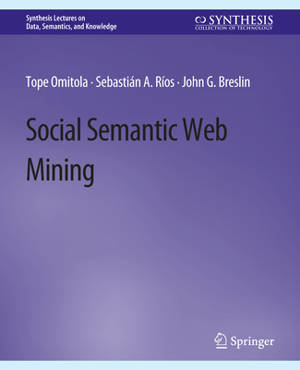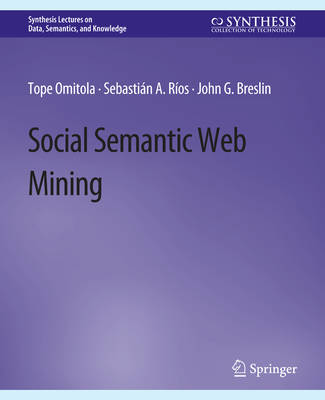
- Afhalen na 1 uur in een winkel met voorraad
- Gratis thuislevering in België vanaf € 30
- Ruim aanbod met 7 miljoen producten
- Afhalen na 1 uur in een winkel met voorraad
- Gratis thuislevering in België vanaf € 30
- Ruim aanbod met 7 miljoen producten
Zoeken
€ 53,45
+ 106 punten
Uitvoering
Omschrijving
The past ten years have seen a rapid growth in the numbers of people signing up to use Web-based social networks (hundreds of millions of new members are now joining the main services each year) with a large amount of content being shared on these networks (tens of billions of content items are shared each month). With this growth in usage and data being generated, there are many opportunities to discover the knowledge that is often inherent but somewhat hidden in these networks. Web mining techniques are being used to derive this hidden knowledge. In addition, the Semantic Web, including the Linked Data initiative to connect previously disconnected datasets, is making it possible to connect data from across various social spaces through common representations and agreed upon terms for people, content items, etc. In this book, we detail some current research being carried out to semantically represent the implicit and explicit structures on the Social Web, along with the techniques being used to elicit relevant knowledge from these structures, and we present the mechanisms that can be used to intelligently mesh these semantic representations with intelligent knowledge discovery processes. We begin this book with an overview of the origins of the Web, and then show how web intelligence can be derived from a combination of web and Social Web mining. We give an overview of the Social and Semantic Webs, followed by a description of the combined Social Semantic Web (along with some of the possibilities it affords), and the various semantic representation formats for the data created in social networks and on social media sites. Provenance and provenance mining is an important aspect here, especially when data is combined from multiple services. We will expand on the subject of provenance and especially its importance in relation to social data. We will describe extensionsto social semantic vocabularies specifically designed for community mining purposes (SIOCM). In the last three chapters, we describe how the combination of web intelligence and social semantic data can be used to derive knowledge from the Social Web, starting at the community level (macro), and then moving through group mining (meso) to user profile mining (micro).
Specificaties
Betrokkenen
- Auteur(s):
- Uitgeverij:
Inhoud
- Aantal bladzijden:
- 138
- Taal:
- Engels
- Reeks:
Eigenschappen
- Productcode (EAN):
- 9783031794582
- Verschijningsdatum:
- 22/01/2015
- Uitvoering:
- Paperback
- Formaat:
- Trade paperback (VS)
- Afmetingen:
- 191 mm x 235 mm
- Gewicht:
- 307 g

Alleen bij Standaard Boekhandel
+ 106 punten op je klantenkaart van Standaard Boekhandel
Beoordelingen
We publiceren alleen reviews die voldoen aan de voorwaarden voor reviews. Bekijk onze voorwaarden voor reviews.







